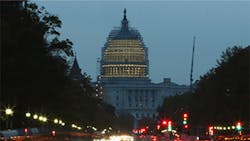Are the Election Results Good for Manufacturers?
IndustryWeek talked to Chad Moutray chief economist for the National Association of Manufacturers (NAM) and Scott Paul, president of the Alliance for American Manufacturers (AAM) to get their take on what the election results mean.
Q: Was the election outcome good for manufacturers?
CM: Yes, overall this was a good election result. I feel that we were successful in getting the word out about creating a pro-growth environment for manufacturing. I think the election is bringing in candidates from both parties that have manufacturing’s best interest in mind.
SP: Potentially yes. I think there will be added pressure to get things done, which would be valuable. However there is a lot that Congress needs to do over the next two years.
Q: Is this an end to gridlock?
CM: Well that depends. I do think that Congress was sent a message by the American people that they want policy makers to work together and solve problems. It is in the best interest of both parties to do that. I think there is a narrow window where we can solve some real problems. Now Congress has to deliver results.
SP: I don’t know. The Senate still needs 60 votes to get a lot of its work done and that calls for both parties to cooperate. There are models for how this could reduce gridlock, such as the case of the animosity between Newt Gingrich and President Clinton in the 1990s. They still had a record of accomplishments based on measures that were signed.
However there is no guarantee of any less gridlock as there will be dissension within the Republican party as to the basic role of government and levels of investment in various government functions. However I do think this Congress will feel some duty to try and move forward on issues of common concern.
Q: Which policies will your group pursue with this new Congress?
CM: The budget is the first order of business.
After that tax reform is essential as we need to do something about the anti-competitive tax issues.
Next the U.S. needs trade promotion authority. I think the reports out this week that shows declining exports makes the case. And related to that we want to see the re-authorization of the Export-Import Bank.
SP: The first issue that must be dealt with is infrastructure.
The next is opening foreign markets while enforcing rules of trade including currency.
And the third is ensuring tax reform encourages manufacturing rather than taking from it.
